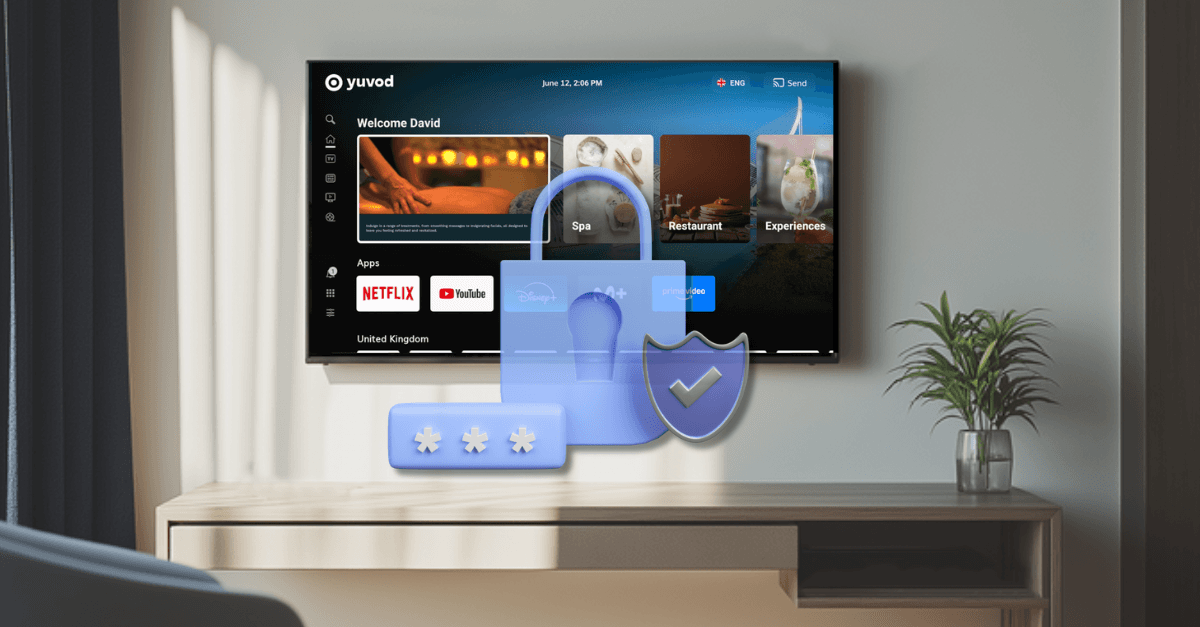Jun 26, 2025
You walk into your hotel room after a long day of travel. The TV screen welcomes you by name—and in your own language. A list of local spots you might enjoy appears, and with just a couple of clicks, you're logging into your streaming platform to watch your favorite show.
It feels intuitive. Seamless. Almost like the room knows you.
This kind of experience isn’t just nice to have—it’s quickly becoming the norm. Guests today want more than a clean room and good Wi-Fi. They expect hotels to match the level of personalization they’re used to in their digital lives. But behind all those thoughtful touches, there’s something much more delicate at play: their personal data.
Personalization, Meet Privacy
Here’s the thing: personalization only works if the hotel knows something about the guest. Not everything, not in a creepy way—but enough to create a stay that feels custom-built. Language preferences, content recommendations, maybe even restaurant suggestions based on past visits.
But as hotels get smarter with technology, the line between “thoughtful” and “intrusive” can get blurry fast. Especially when the average guest has no idea what’s being collected—or what happens to that data after checkout.
One of the smartest moves a hotel can make is choosing technology partners that take data privacy seriously—not just in words, but in how their systems are built. Look for solutions that automatically erase any personal information, such as streaming credentials or browsing history, the moment a guest checks out. This isn’t just a nice-to-have—it’s essential. By relying on platforms designed with guest privacy in mind, you minimize risk, stay compliant, and send a clear message: your guests’ trust matters just as much as their comfort.
So, How Do You Get It Right?
It’s not about abandoning personalization. Far from it. It’s about doing it in a way that makes people feel safe and in control. Here's how leading hotels are navigating that balance:
1. Keep It Clear, Not Complicated
Nobody wants to read a ten-paragraph privacy policy at check-in. But guests do appreciate a quick and clear explanation: “We use this information to enhance your experience, and your data will be automatically deleted at check-out.” Simple. Respectful.
2. Let Guests Take the Wheel
Want to connect your Netflix account to the room TV? Great. Don’t want to? Also great. The key is giving guests the choice, not making the decision for them.
And just as important: make sure everything disconnects automatically when they leave. No one wants the next guest to see what they were watching.
3. Don’t Keep What You Don’t Need
Session-based data is your friend. If you can personalize the stay without storing personal info long-term, do that. The less you keep, the less you risk.
4. Pick Partners Who Take Privacy Seriously
Your tech providers matter. Make sure the platforms you use (TV systems, PMS integrations, guest apps) have solid security protocols and follow data protection laws to the letter.
At Yuvod, for example, guest streaming credentials are never stored on the hotel network. Everything is temporary, and wiped clean at checkout. That’s the kind of detail that builds trust.
5. Privacy as Part of the Experience
This isn’t just about ticking a compliance box. It’s about giving guests peace of mind. And that, in itself, is part of the service you offer. A room that protects guests’ privacy instantly feels more welcoming.
The Bottom Line
Great hospitality has always been about anticipating needs without being intrusive. The same principle applies to digital personalization.
Give guests the best of both worlds: an experience that feels personal, without ever feeling like they’ve given up their privacy. When hotels get this balance right, they don’t just meet expectations—they create loyalty.
And in an industry built on return visits and word of mouth, that’s what really matters.
Industries
Hospitality
IPTV/OTT operators
Content owners
Sports platforms
Contact
info@yuvod.com

